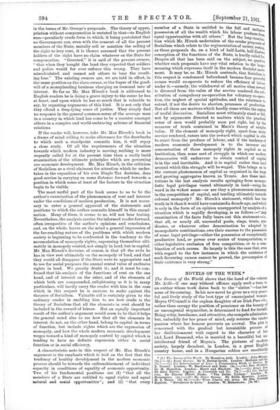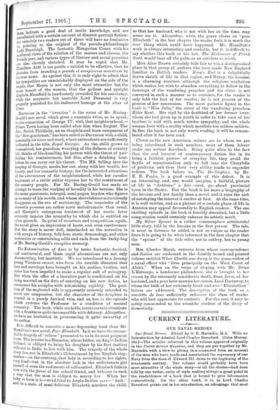NOVELS OF THE WEEK.*
The Snares of the World shows that the hand of the veteran Mr. Aide—if one may without offence apply such a term to an author whose work dates back to the " sixties "—has lost none of its cunning. In his new novel he gives us a very grace- ful and lively study of the best type of emancipated woman. Moyra O'Connell is the orphan daughter of an Irish Peer who, rather than occupy the position of pensioner on the bounty of an uncongenial stepmother, is determined to fend for herself. Being witty, handsome, and attractive, she compels admiration, but, unluckily for her peace of mind, only returns the tender passion where her honour prevents an avowal. The plot is concerned with the gradual but irresistible process of her disillusionment with regard to the character of her idol, Lord Desmond, who is married to a beautiful but an- intellectual friend of Moyra's. The pictures of modem society, largely decadent, in London, in a great English country house, and in a Hungarian schloss are excellently • (1.) The Snares of the World. By Hamilton Aide. London John Norm. L663.13,71,1-(2.) Royal Georgic. By S. ]sating-Gould. London: Methuen and CO. s. —(3.) The Extermination of Late: a Fragmentary Study in Erodes. By . rd. London : W. Blackwood and Sons. 163.1—(4.) Poor guava. By N. Hamilton. London: Hurst and Itlackett. F.3--(5,) Kings pvi. By Alice Brown. Laudon: A. Constable and Co. .J—(6.) The Darlaat tons. By Elmore Elliott Peake. "The Dollar ibrary." London: Heinemann. [4s.]—(7.) My Silver Spoons. By Edith Hawtrey. London: H. J. Drone. 6d.]—(8.) When Charlie was Away. By Mrs. Poultry Bigelow. " Novelettes de Luse." London : W. Heinemann. [26.
Indicate a good deal of inside knowledge, and are done,
embellished with a certain amount of discreet portrait fiction : for certainly two readers out of three will have no hesitation in pal a" - tar to the original of the pseudo-philanthropic Lady Bramleigh. The fantastic Hungarian Count with his
mediaeval views of the relation of the masses and classes, the
;reach poet, and various types of literary and social parasites are also cleverly sketched. It may be urged that Mr.
Hamilton Aide is too gentle a satirist to be effective, that he abstains from branding a grande et conspicuum monstrum by its true name.. As against this, it is only right to admit that his sympathies are unmistakably displayed on the side of the
;Inaba that Moyra is not only the most attractive but the most honest of the women, that the gallant and upright Captain Mansfield is handsomely rewarded for his constancy, while the magnetic but unstable Lord Desmond is very properly punished for his indiscreet homage at the altar of Circe.
Dartmoor in the " twenties " is the scene of Mr. Baring- Gould's new novel, which gives a romantic twist, so to speak,
to the connection of George IV. with that neighbourhood,—
Prince Town having been called after him when Regent. The Rev. Josiah Thia.kleby, an ex-chaplain and boon companion of the" first gentleman," has been exiled to Dartmoor with aehild, nominally his niece and ward, whose antecedents are sufficiently indicated in the title, Royal Georgie. As the child grows to
womanhood, her guardian, wearying of the dulness of country
life, thinks of blackmailing his patron with the threat of pub- lishing his reminiscences, but dies, after a drinking bout, before he can carry out his threat. The MS. falling into the keeping of Georgie, marks her out, along with her wealth, her beauty, and her romantic history, for the interested attentions of the adventurers of the neighbourhood, while her cavalier
treatment of a rustic suitor exposes her to the resentment of the country people. For Mr. Baring-Gould has made no
attempt to trace the working of heredity in his heroine. She is the same passionate, intrepid, semi-pagan hoyden who figures in so many of his novels, and whose shrewishness miraculously disappears on the eve of matrimony. The remainder of the dramatis personae are rather more melodramatic than usual, and Georgia's outrageous treatment of her rustic lover seriously impairs the sympathy to which she is entitled on other grounds. In point of structure and composition, again, the novel gives an impression of haste, and even carelessness.
But the story is never dull, interlarded as the narrative is with scraps of history, folk-lore, rustic demonology, and other instructive or entertaining odds and ends from the lucky-bag of Mr. Baring-Gould's receptive memory.
The Extermination of Love is by turns fantastic, farcical, and sentimental, and these rapid alternations are not only disconcerting, but inartistic. We are introduced to a dreamy young Viennese savant, who from the terrible disasters that love and marriage have brought on his mother, brother, and sister has been impelled to make a regular cult of misogyny.
But when the offer of a lucrative post is conditional on his being married on the date of entering on his new duties,_ lie
overcomes his scruples with astonishing rapidity. The posi- tion of the neglected wife is apparently seriously intended to move our compassion, but the character of the daughter is
treated in a purely farcical vein, and so, too, is the episode which restores the. Professor to a condition of normal humanity. The book, while readable, treats certain situations with a frankness quite incompatible with delicacy. Altogether, we have no hesitation in pronouncing it quite-unworthy of its author.
It is difficult to conceive a more depressing book than Mr. Hamilton's new novel, Poor Elisabeth. In it we have the irreme-
diable tragedy of "colour" presented to us in its most poignant
form. The heroine is a Eurasian,. whose. father, an Anglo-Indian Colonel, is obliged to bring his daughter by his first (native) wife out to India to live with him. The tragedy of the whole
story lies, not in Elizabeth's ill-treatment by her English step-
mother—on the contrary, that lady is, according to her lights, very kind—but in the absolute lack in the unfortunate girl
herself of even the rudiments of self-control. Elisabeth falls in
love with the fiance of her school friend, and behaves in such away' that the man is obliged, to marry her. When her
.wy is born it is—word fatal to Anglo-Indian ears—" dark," and in a state of semi-delirium Elisabeth murders the child, so that her husband, who is not with her at the time, may never see it. Altogether, when the grave closes on "poor Elisabeth" in the last chapter the reader feels it is much the best thing which could have happened. Mr. Hamilton's work is always interesting and readable, but it is difficult to say whether this book or his last, The Dishonour of Frank Scott, would bear off the palm as an antidote to mirth.
Miss Alice Brown certainly bids fair to win a distinguished place in that group of authors who have made New England familiar to British readers. King's End is a delightfully drawn sketch of life in that region, and Nancy, the heroine, is a charming creature, although the religious exaltation which makes her wish to abandon everything to follow in the footsteps of the wandering preacher and his sister is not conveyed in such a manner as to convince, for the reader is only told the fact of her resolve ; he is not present at the process of her conversion. The most pathetic figure in the book is " Miss Julia," the sister of the wandering preacher. Elder Kent. Her vigil by the deathbed of her former lover, whom she had given up in youth in order to take care of her brother, is told with much tender sympathy, and the whole woman lives with a. reality which novelists too seldom achieve. In fine, the book is not only worth reading, it will be remem- bered after it has been read.
Clever as the new American writers are to whom we are being _introduced in such numbers, most of them labour under_one serious drawback. Being quite alive to the fact that the real interest of contemporary fiction lies in its being a faithful picture of everyday life, they avoid the Scylla - of sensationalism only to fall into the Charybdis of • prolixity, and thus their very ability tends to engender tedium. The book before us, The. Darlingtons, by Mr. E. E. Peake, .is a good example of this defect. It is an interesting, and, one would imagine, a faithful, picture of life in " Ashboro," a fair - sized, go - ahead provincial town in the States. But the book is far more a biography of the heroine and her family than a novel, and it runs the risk of outstaying the interest it excites at first. At the same time, it is well written, and as a picture of a certain phase of life in America may appeal favourably to English readers. The one exciting* episode in the book is forcibly described, but a little comp ression would certainly enhance its artistic merit.
My Silver Spoons is a rather commonplace sentimental little story, told by the heroine in the first person. The tale, it must in fairness be added, is not so vulgar as the reader fears it is going to be when informed in the first chapter that the " spoons " of the title refer, not to cutlery, but to young men.
Mrs. Charles Marsh, extracts from whose correspondence and diaries are enshrined in the daintily bound and printed volume entitled When Charlie was Away, is the grass-widow of a naval officer who " lives principally on the West Coast of Africa." When on the verge of eloping with Mr. Brian L'Estrange, a handsome philanderer, she is brought to her senses by the extremely considerate death, from fever, of her husband, and a year later marries her cousin, Lord Darraway, to whom the bulk of her extremely frank and neo-" Elizabethan" letters are addressed. The description of the book as a novelette de luxe sufficiently indicates the class of reader who will best appreciate its contents. For the rest, it may be safely commended to the scientific student of the decay of domesticity.







































 Previous page
Previous page